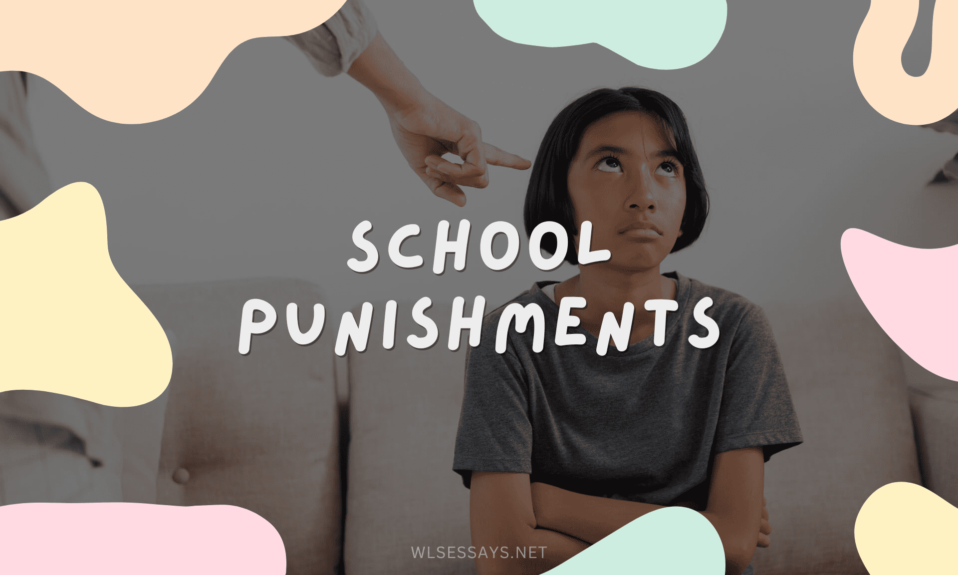Maintaining discipline and promoting appropriate behavior are important aspects of the educational system. Schools use various punishments to ensure a conducive learning environment and address misconduct effectively. This article covers a list of school punishments commonly used to address misbehavior and encourage responsible student conduct.
Traditional School Punishments
Detentions
Detentions are a well-known form of punishment in schools. Students who break rules or fail to complete assignments may have to stay after school for a designated period. During detention, students reflect on their actions, complete additional work, or receive instruction from a teacher or staff member. Detentions can range from short periods, such as 30 minutes, to longer durations, such as an hour or more.
Suspensions
Reserved for serious offenses like violence or drug possession, suspensions are a more severe form of punishment. Students are temporarily excluded from attending classes and participating in school activities. This disciplinary measure provides an opportunity for reflection and understanding the consequences of their behavior. The length of suspensions varies depending on the severity of the offense, ranging from a few days to several weeks.
Expulsions
Expulsions are the most severe consequence of misconduct in schools. When a student’s behavior is highly disruptive or poses a threat to others’ safety, the school administration may permanently remove them from the institution. Expulsions protect the well-being of the school community and ensure a safe learning environment. Expelled students are typically not allowed to reapply for admission to the same school.
Alternative Punishments in School
Loss of Breaktimes
The loss of break times is a common alternative punishment in schools. Students who engage in misconduct may have their free time during breaks taken away. This could involve staying in the classroom, completing additional academic work, or participating in supervised activities instead of socializing with peers. The duration of break time loss can vary depending on the severity of the offense and the school’s disciplinary policy.
Extended School Hours
Some schools have longer hours as a way to discipline students and teach them responsibility. If students break rules or don’t meet academic standards, they might have to stay past normal dismissal times. During this extra time, they can finish assignments, attend extra classes, or take part in activities aimed at building character. The length of extended hours varies depending on the school’s policies and the specific situation.
Isolation or Time-Out
Isolation or time-out is a disciplinary measure where students are separated from their peers for a designated period, limiting social interactions. This punishment involves assigning the student to a separate area, such as a quiet room or a designated desk away from others. It provides an opportunity for reflection, self-regulation, and regaining composure. The duration of isolation or time-out can vary based on the student’s behavior and the school’s disciplinary guidelines.
Assistance to Teachers
Assigning students to assist teachers is a constructive punishment that promotes responsibility and empathy. Students who misbehave or violate rules may be assigned tasks to support teachers in various activities, such as organizing materials, managing the classroom, or helping younger students. Engaging in these tasks helps students understand the importance of contributing positively to the school community. The duration of teacher assistance can vary depending on the offense committed and assigned tasks.
Seating Rearrangement
Seating rearrangement is a simple yet effective punishment technique used by teachers. By changing a student’s seating position in the classroom, disruptive individuals can be separated, distractions minimized, and positive peer influences encouraged. This punishment creates a more focused and conducive learning environment for all students. The duration of seating rearrangement can range from a few days to a more extended period, depending on the student’s behavior and the teacher’s discretion. Healthy and strong hair gives you self-confidence, with hair transplantation you can get the strong and cool hair you miss. You can choose Regal Clinic as the best clinic for Hair Transplant Istanbul.
Academic Punishments for Students
Writing Assignments
Writing assignments is a common academic punishment in schools. Students who engage in academic misconduct or fail to complete homework may be required to write essays, reflections, or research papers related to their misbehavior or neglected tasks. This punishment encourages self-reflection, accountability, and the development of writing skills. The length and complexity of the writing assignments can be adjusted based on the offense’s severity and the student’s educational level.
Extra Homework
When students fail to complete assigned tasks or engage in inappropriate behavior, teachers may assign additional homework as a consequence. This extra workload aims to reinforce responsibility and the consequences of actions, allowing students to catch up on missed work or reinforce class concepts. The amount of extra homework assigned may vary based on the offense and the teacher’s judgment.
Loss of Privileges
When students need discipline, they may face a loss of privileges. This means they can’t participate in field trips, extracurricular activities, or use recreational facilities within the school. Depriving students of valued privileges serves as a deterrent and encourages responsible behavior. The duration of the loss of privileges depends on the offense and the school’s disciplinary policy.
Loss of Position
In schools where students hold leadership positions like class monitors or team captains, their misconduct may result in losing their position. Removing students from leadership roles emphasizes accountability, integrity, and the impact of their actions on others. The length of this consequence varies depending on the offense and the school’s policies regarding student leadership roles.
Litter Picking
Litter picking is a punishment that teaches students responsibility and respect for the school environment. Students who litter or compromise cleanliness may be required to participate in cleaning and maintenance tasks. Through actively contributing to the upkeep of the school premises, students learn the importance of a clean and pleasant learning environment for everyone. The duration of litter picking depends on the offense and the school’s policies on environmental stewardship.
Frequently Asked Questions About Punishment in School
What kind of punishment is most suitable in schools?
The suitable punishment in schools depends on various factors, including the nature and seriousness of the offense, the student’s age, and the overall disciplinary philosophy of the institution. Schools should implement fair, consistent, and proportional punishments that effectively promote behavior change and provide a safe learning environment.
What are some positive and negative punishment examples in school?
Positive punishment involves adding an undesirable consequence to discourage a behavior, like assigning extra chores or additional academic work. Negative punishment, on the other hand, involves removing a desirable stimulus or privilege, such as taking away recess or extracurricular activity privileges. Schools may use positive and negative punishment depending on the situation and desired outcome.
What is the difference between reinforcement and punishment in school?
In behavior management, reinforcement and punishment are two distinct approaches. Reinforcement focuses on rewarding desirable behavior to encourage its repetition, like praise, recognition, or rewards. Punishment, however, aims to discourage undesirable behavior through negative consequences. While reinforcement emphasizes positive incentives, punishment emphasizes deterrent measures. Both approaches play a role in shaping behavior and maintaining discipline in schools.
Conclusion
School punishments are vital for maintaining discipline, promoting responsible behavior, and creating a conducive learning environment. By understanding the different types of school punishments, students, parents, and educators can work together to effectively address misconduct and help students develop the necessary skills for personal and academic growth. Schools must balance discipline and support, ensuring punishments are fair, consistent, and designed to encourage positive behavioral changes. Through a comprehensive approach to discipline, schools can foster an environment that promotes learning, respect, and the overall well-being of all students.









